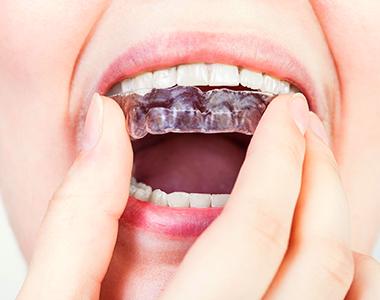
What is a mouthguard?
A mouthguard is a specially made, rubber-like cover that fits exactly over your teeth and gums, cushioning them and protecting them from damage.
When would I need a mouthguard?
It is important to wear a professionally made mouthguard whenever you play a sport that involves physical contact or moving objects. This includes cricket, hockey and football – which can cause broken and damaged teeth; and American football, boxing and rugby – which can all cause broken or dislocated jaws. A mouthguard will help protect against these happening.
Where can I get one made?
Your dental team will be happy to make you a custom-made mouthguard, which will fit your mouth exactly and protect your teeth and gums properly. Custom-made mouthguards can prevent damage to the jaw, neck and even the brain – helping to prevent concussion and damage caused by a heavy blow.
How much will it cost?
Costs can vary from dentist to dentist. Ask your dental team about mouthguards and always get an estimate before starting treatment. When you consider the cost of expensive dental work and the risk of losing teeth, it is a small price to pay for peace of mind.
How long do custom-made mouthguards last?
Depending on your age, your mouthguard may need replacing fairly regularly. If you are still growing, new teeth will come through and move into position. So the mouthguard may become too tight or loose, and will need to be remade to fit the new shape of your mouth.
Types of Mouth Guards
As Healthline so helpfully explains, there are three distinct types of mouthguards. They are stock mouthguards, boil and bite mouthguards, and custom-made mouthguards. Now, you’ll really only see the first two types in your local sporting goods store. These keep you or your kids from losing a tooth or biting through their tongue during any serious impact.
Stock
Stock mouthguards are essentially one-size-fits-all, and you’ll usually see them in organized sports. You may need to clip the back ends of the guard for smaller mouths. Still, remember it isn’t intended to fit perfectly.
Boil and Bite
Boil and bite guards are more common in martial arts due to the sheer number of times you’re likely to be hit in the face while sparring. In this case, you take a standard boil and bite guard. First, you need to place it in boiling water for a specified amount of time. Then, you fish it out, let it cool for a few seconds, and put it around your teeth. To help the guard form the shape of your mouth, use clean fingers and your tongue to gently push the guard against your teeth. Creating a little suction helps as well.
Custom and Dental
However, if you’re recommended a mouthguard due to a health concern, you will probably need to make an appointment with your dentist. For chronic grinding and sleep apnea, you will need to have a customized mouthguard made specifically for you.
Cleaning your Mouth Guard
Every human mouth contains about six billion bacteria, so all mouthguards should be cleaned after every use. You should also consider keeping two cases, one where you store your mouthguard after use and one where you store it once it has been cleaned to avoid cross-contamination.
To clean your mouth guard, avoid using hot water. Most mouthguards are made of rubberized material, so using hot water risks warping its shape. Instead, rinse it with mouthwash and brush it with a toothbrush and toothpaste. Additionally, make sure your case(s) provide ventilation, as a wet mouthguard is a perfect breeding ground for bacteria and other potential pathogens.
The American Dental Association suggests using this cleaning ritual to check for any damage, which could undermine the efficacy of your mouthguard. The ADA also suggests bringing your mouthguard with you to dental office visits. This will allow your dentist to inspect it with a trained eye. He then can help you determine whether it needs to be replaced.
Continued Mouthguard Care
Keeping your mouthguard clean and dry will help it last much longer and continue to do its job. Remember that if you have kids that wear mouthguards, it is imperative that you help them to understand how important hygiene is in this case. Inappropriate care and mouthguard sharing can lead to the transmission of dangerous diseases, so it may be worth your time to have your dentist or physician explain the importance of keeping their mouthguard clean. You can only control how it’s cared for once they get home. So, they need to correctly care for it on the field or in the ring.
https://my.clevelandclinic.org/health/articles/10910-mouthguards


 Review Us
Review Us Review Us
Review Us